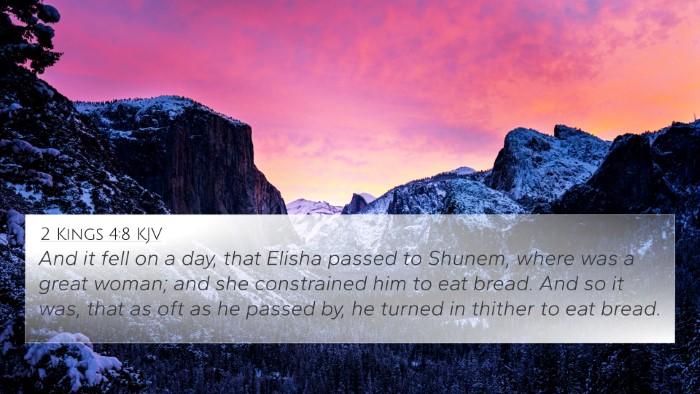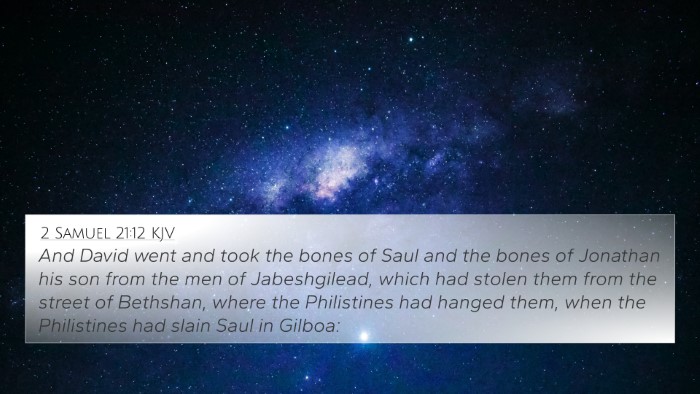Understanding 1 Samuel 28:4
The verse 1 Samuel 28:4 states:
"And the Philistines gathered themselves together, and came and pitched in Shunem: and Saul gathered all Israel together, and they pitched in Gilboa."
Summary of 1 Samuel 28:4
This verse sets the stage for a significant encounter in the life of King Saul. The gathering of the Philistines at Shunem signifies the impending conflict, while Saul's gathering of Israel at Gilboa reflects his desperation and fear in the face of imminent battle.
Key Themes
- Conflict and Warfare: The verse introduces a major conflict between the Israelites and Philistines, highlighting the perpetual struggles faced by God's people.
- Leadership and Fear: Saul's actions depict a leader under pressure, emphasizing his waning faith and resilience.
- Desperation for Guidance: The gathering hints at Saul's need for divine intervention in his critical situation.
Bible Verse Cross-References
To better understand 1 Samuel 28:4, it is crucial to examine related scripture that provides additional insights and context. Below are some pertinent cross-references:
- 1 Samuel 28:5: Saul's fear upon seeing the Philistines reinforces the emotional turmoil he faces.
- 1 Chronicles 10:1: This passage recounts the battle where Saul's downfall is further elaborated.
- Exodus 14:10-12: In moments of confrontation, fear can lead to dire outcomes, mirroring Saul's predicament.
- Psalm 56:1-3: A plea for divine assistance amidst fear connects to Saul's state of mind.
- 1 Samuel 29:4-5: The Philistines' relationship with Saul is further explored, showing how deep their conflict runs.
- 1 Samuel 31:1-4: The outcome of Saul and the Philistines is revealed, providing context to 1 Samuel 28:4.
- 2 Samuel 1:10: A recounting of Saul's demise relates to the events initiated in 1 Samuel 28:4.
Interpretations from Public Domain Commentaries
Matthew Henry
Matthew Henry asserts that this verse illustrates the deepening tension between the Israelites and Philistines, showcasing Saul's failure as a leader who is overwhelmed by fear. He emphasizes the importance of seeking God's guidance, which Saul neglects, leading to further despair.
Albert Barnes
Albert Barnes comments on the geographical significance of the locations mentioned, noting that Shunem and Gilboa were pivotal battlegrounds. He highlights Saul's strategic positioning and his inner conflict, portraying Saul as a tragic figure faced with dire choices.
Adam Clarke
Adam Clarke focuses on the implications of the Philistines gathering. He views it not only as a military threat but also a divine test of faith for Saul and Israel. Clarke notes the spiritual decline evident in Saul's actions, drawing attention to his failure to consult God.
Linking Bible Scriptures
In the context of cross-referencing Biblical texts, 1 Samuel 28:4 can be explored through the lens of various themes and connections:
- Leadership Challenges: See also Nehemiah 4:14, where leaders face opposition yet inspire courage among their people.
- Divine Guidance: Proverbs 3:5-6 teaches reliance on God for direction, a lesson Saul neglects.
- Fear in Battle: Joshua 1:9 encourages strength and courage, contrasting with Saul's fear.
- God’s Sovereignty: Romans 8:31 reassures believers of God's presence even amidst trials, which Saul fails to recognize.
- Historical Conflict: The continual battles with the Philistines can be compared with Judges 14:1-3, illustrating the ongoing struggle of Israel.
Understanding the Context
The backdrop of 1 Samuel 28:4 is essential for interpreting its meaning. Saul, having lost favor with God, seeks answers in the wrong places, evident in his decision to consult the witch at Endor (1 Samuel 28:7-20). This verse captures the tension between his military strategy and spiritual desolation.
Thematic Bible Verse Connections
The themes of fear, desperation, and the search for God’s will resonate throughout the Scriptures. Understanding these themes assists in forming a robust cross-reference analysis:
- Error in Leadership: Exodus 32 – Moses faces a similar challenge when leading God’s people and seeks divine intercession.
- Divine Intervention: 2 Kings 19:14-20 highlights King Hezekiah’s reliance on God in times of distress.
- Consequences of Disobedience: Hebrews 12:25 – A reminder to heed God's voice and obey, echoing Saul's tragic neglect.
Conclusion
In conclusion, 1 Samuel 28:4 serves as a poignant reminder of the complexities of faith, leadership, and the inevitable struggles within the spiritual battle. Utilizing tools for Bible cross-referencing can deepen one's understanding, revealing the intricate tapestry of scriptural narratives woven throughout the Bible.








